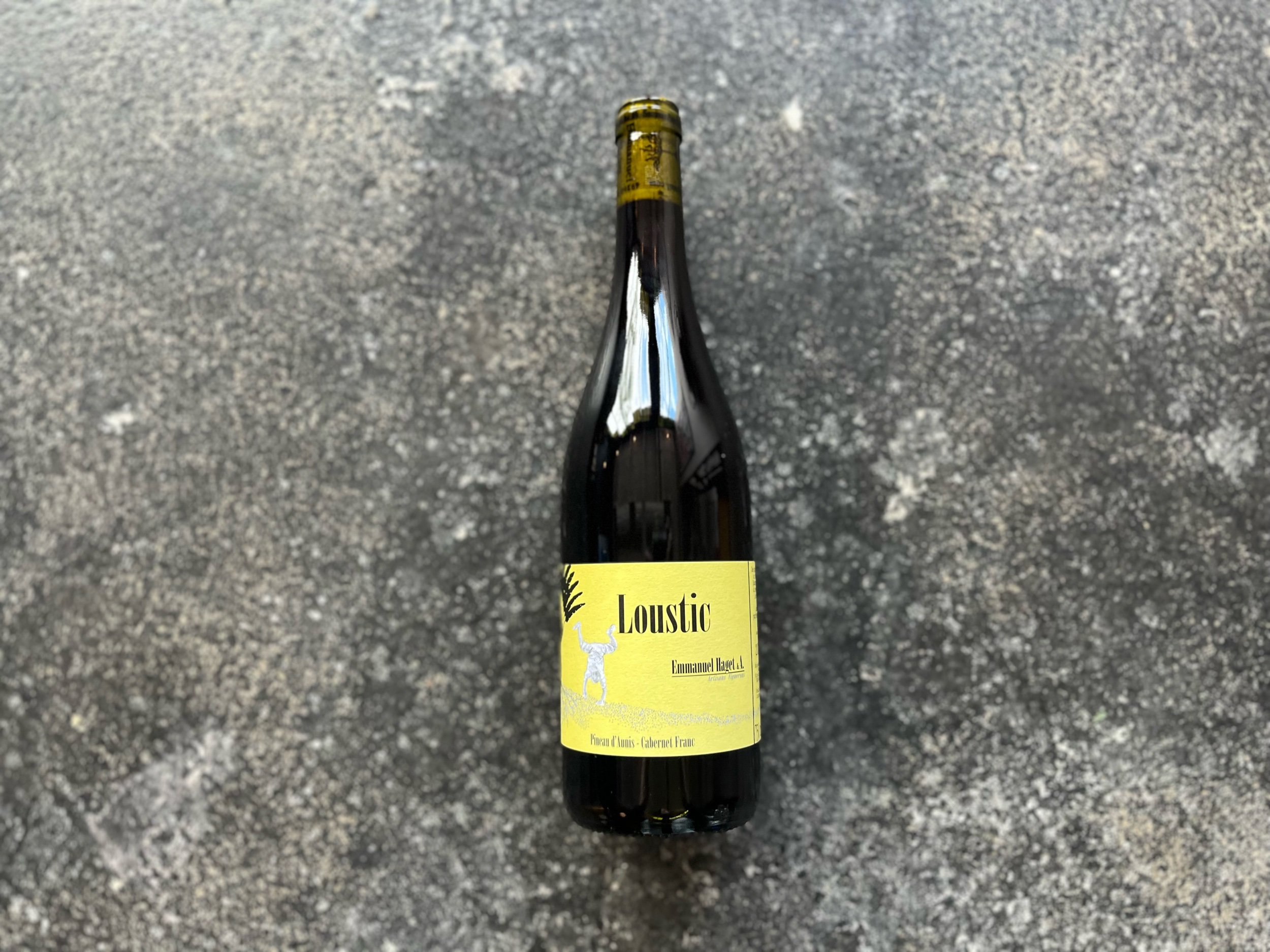Emmanuel Haget ‘Loustic’ Rouge 2023
Location: France, Loire, Puy-Notre-Dame
Winemaker: Emmanuel Haget
Grapes: 70% Cabernet Franc, 30% Pineau d’Aunis,
Winemaking: The Pineau d’aunis is from Manu’s Clos Saint Jacques vineyard in Saumur Puy-Notre-Dame. This parcel contains the vineyard’s oldest vines. Soils are a combination of sandy-clay silt and alterite of green chalk. Cabernet Franc is from the lieu dit Les Vigneux.
From the Importer Terrestrial: Emmanuel Haget spent 20 years as a geophysicist before he came to winemaking. Motivated by a strong desire to leave the temptations and fast pace of modern life for a more deliberate, humble life surrounded by nature, he found his way to a little-known area known as Le Puy-Notre-Dame, which is situated around 20 minutes south of Saumur in the middle Loire Valley.
Passionate about ecology and sustainable farming, Manu had the good fortune of meeting Philippe Gourdon, one of the leaders in biodynamic viticulture in the region shortly after he arrived. As Gourdon neared retirement age, he agreed to sell his vines and cellar to Manu in late 2016. Beginning with the 2017 vintage, Manu has continued the tradition of the domaine, maintaining the biodynamic practices in the existing parcels, and converting new parcels as soon as he takes over. Holdings now consist of 5 parcels, totaling 3.8 ha, with a mix of Chenin, Pineaud’Aunis, and AOC Saumur Puy-Notre-Dame Cabernet Franc (the only grape permitted by the appellation).
Manu’s thoughtfulness and attention to detail extends from the vineyards to the cellar. From the more convivial and brighter Pétillant and the Pineau d’Aunis-focused reds, to the more cerebral and focused single-parcel Cabernet Francs and Chenin, he manages to imbue a sense of brightness, joy, and beautiful simplicity in each of his wines. He firmly believes that transparency comes from hard work in the vines, and the often excruciatingly low yields that come with ecologically sound farming. All fermentations are completed using indigenous yeasts, and when the wines do receive SO2, it never totals more than around 2.5g/hl.
Location: France, Loire, Puy-Notre-Dame
Winemaker: Emmanuel Haget
Grapes: 70% Cabernet Franc, 30% Pineau d’Aunis,
Winemaking: The Pineau d’aunis is from Manu’s Clos Saint Jacques vineyard in Saumur Puy-Notre-Dame. This parcel contains the vineyard’s oldest vines. Soils are a combination of sandy-clay silt and alterite of green chalk. Cabernet Franc is from the lieu dit Les Vigneux.
From the Importer Terrestrial: Emmanuel Haget spent 20 years as a geophysicist before he came to winemaking. Motivated by a strong desire to leave the temptations and fast pace of modern life for a more deliberate, humble life surrounded by nature, he found his way to a little-known area known as Le Puy-Notre-Dame, which is situated around 20 minutes south of Saumur in the middle Loire Valley.
Passionate about ecology and sustainable farming, Manu had the good fortune of meeting Philippe Gourdon, one of the leaders in biodynamic viticulture in the region shortly after he arrived. As Gourdon neared retirement age, he agreed to sell his vines and cellar to Manu in late 2016. Beginning with the 2017 vintage, Manu has continued the tradition of the domaine, maintaining the biodynamic practices in the existing parcels, and converting new parcels as soon as he takes over. Holdings now consist of 5 parcels, totaling 3.8 ha, with a mix of Chenin, Pineaud’Aunis, and AOC Saumur Puy-Notre-Dame Cabernet Franc (the only grape permitted by the appellation).
Manu’s thoughtfulness and attention to detail extends from the vineyards to the cellar. From the more convivial and brighter Pétillant and the Pineau d’Aunis-focused reds, to the more cerebral and focused single-parcel Cabernet Francs and Chenin, he manages to imbue a sense of brightness, joy, and beautiful simplicity in each of his wines. He firmly believes that transparency comes from hard work in the vines, and the often excruciatingly low yields that come with ecologically sound farming. All fermentations are completed using indigenous yeasts, and when the wines do receive SO2, it never totals more than around 2.5g/hl.
Location: France, Loire, Puy-Notre-Dame
Winemaker: Emmanuel Haget
Grapes: 70% Cabernet Franc, 30% Pineau d’Aunis,
Winemaking: The Pineau d’aunis is from Manu’s Clos Saint Jacques vineyard in Saumur Puy-Notre-Dame. This parcel contains the vineyard’s oldest vines. Soils are a combination of sandy-clay silt and alterite of green chalk. Cabernet Franc is from the lieu dit Les Vigneux.
From the Importer Terrestrial: Emmanuel Haget spent 20 years as a geophysicist before he came to winemaking. Motivated by a strong desire to leave the temptations and fast pace of modern life for a more deliberate, humble life surrounded by nature, he found his way to a little-known area known as Le Puy-Notre-Dame, which is situated around 20 minutes south of Saumur in the middle Loire Valley.
Passionate about ecology and sustainable farming, Manu had the good fortune of meeting Philippe Gourdon, one of the leaders in biodynamic viticulture in the region shortly after he arrived. As Gourdon neared retirement age, he agreed to sell his vines and cellar to Manu in late 2016. Beginning with the 2017 vintage, Manu has continued the tradition of the domaine, maintaining the biodynamic practices in the existing parcels, and converting new parcels as soon as he takes over. Holdings now consist of 5 parcels, totaling 3.8 ha, with a mix of Chenin, Pineaud’Aunis, and AOC Saumur Puy-Notre-Dame Cabernet Franc (the only grape permitted by the appellation).
Manu’s thoughtfulness and attention to detail extends from the vineyards to the cellar. From the more convivial and brighter Pétillant and the Pineau d’Aunis-focused reds, to the more cerebral and focused single-parcel Cabernet Francs and Chenin, he manages to imbue a sense of brightness, joy, and beautiful simplicity in each of his wines. He firmly believes that transparency comes from hard work in the vines, and the often excruciatingly low yields that come with ecologically sound farming. All fermentations are completed using indigenous yeasts, and when the wines do receive SO2, it never totals more than around 2.5g/hl.

